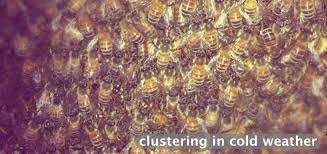
Our days are getting shorter, and the temperatures are getting colder. As the weather gets colder, the bees are going to form a cluster in the hive. This cluster is a mechanism to produce heat. Much like the penguins in the Antarctic, bees rotate from the center of the hive to the outside. The center of the cluster is the warmest, the outside is the coolest. One beekeeper in France measured the temperature of the center of the cluster at 95° F, the outside of the cluster was 71° F, and the outside temperature was 44° F. So don’t expect to see your bees out and about this winter...they’ll be keeping themselves warm!
You do want to keep an eye on your bees to see if they need extra feeding. It’s important to leave at least one super of honey in the hive so that the bees can survive the winter. We like to offer ours sugar water (2 parts sugar, one part water) as well, so that way the honey lasts longer and the bees get the nutrients throughout the winter. It is important that you never feed bees sugar with additives. Powdered sugar, brown sugar and commercial fondant all contain additives that could cause honey bee dysentery. Feel free to add a feeding stimulant to your sugar water to replace the nutrients bees would normally find in honey.
Because you aren’t as busy now with your hives are you are in the Spring and Summer, now is a good time to catch up on your reading. We have many helpful books on beekeeping. A staff favorite is “Beekeeping for Dummies.” This book educates you on the tools of the trade, including complete instructions for building and maintaining beehives; offers detailed and easy-to-follow guidelines for all phases of honey production--including harvesting, bottling, packaging and marketing your honey; explores theories into the recent unexplained collapse of colonies and its environmental and economic on society; and provides new information on mites and diseases and recommend changes in bee medication and treatments.
As always, feel free to contact us if you have any questions about your bees. Until next month, happy beekeeping!
